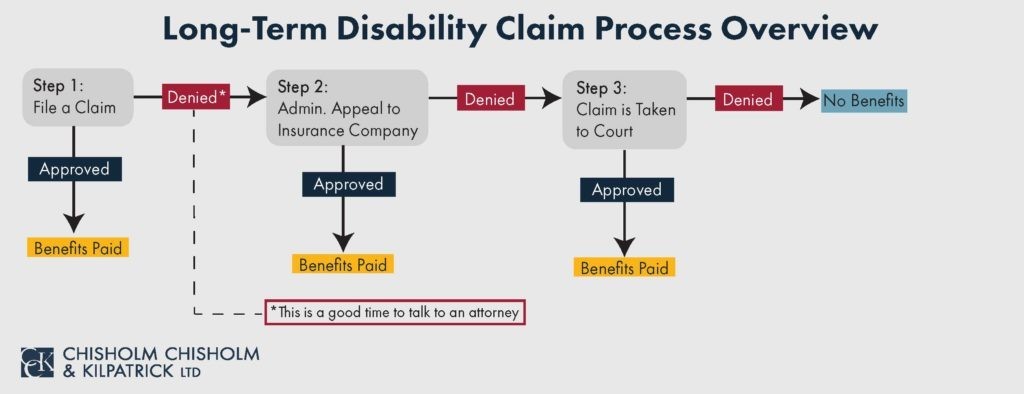Getting Long-Term Disability (LTD) Benefits for Sciatica

What is Sciatica?
Sciatica is pain that radiates from the low back down the leg as a result of irritation or compression of the sciatic nerve in the lumbar spine. The sciatic nerve begins from nerve roots in the lumbar spine and continues down both the right and the left lower limbs. Sciatica is caused (generally) by pressure on one of these nerve roots in your spine and can result from the following medical conditions:
- A herniated or slipped disc
- Degenerative disc disease
- Spinal stenosis, or the narrowing of the spinal canal
- Spondylolisthesis, or the slippage of a vertebra
Although sciatica can affect anyone, it is more common among people suffering from obesity, poor posture, a tumor or cyst in the spinal area, or a blood clot. The pain resulting from sciatica varies depending on where in the spinal column the nerve is pinched or irritated but most often will begin in the lower back and radiate down through the buttock and one leg, occasionally reaching the foot. Other symptoms of sciatica include:
- Numbness of the buttocks and lower extremities, usually in the back of the leg. Sometimes a tingling, “pins and needles” sensation may be present as well
- Weakness and/or a feeling of heaviness in the affected leg
- Posture-induced symptoms such as pain exacerbated by sitting, standing up, bending, twisting, lying down, coughing, etc.

Diagnosing and Treating Sciatica
The pain associated with sciatica is generated by pressure on the sciatic nerve and further complications may develop if left unrelieved or untreated, including loss of feeling or weakness in the affected leg, loss of bowel or bladder function, or permanent nerve damage.
Therefore, it is important to inform your doctor of any pain you experience in your lower back, especially that which radiates into your leg. Along with a general assessment and physical exam, your doctor may conduct the following tests for sciatica:
- X-ray
- MRI
- Electromyography and nerve conduction study
If you are diagnosed with sciatica, rest assured that most cases usually heal with appropriate rest and time. In some cases, certain treatments may also help relieve the pain, such as:
- Nonsteroidal anti-inflammatory (NSAIDS) medicines, such as ibuprofen
- The application of hot or cold packs to the sore muscles
- Massage treatment
- Alternative medicine, such as acupuncture
- Chiropractic treatment
If you find your sciatic pain to be particularly severe, however, more aggressive treatment may be warranted. The longer sciatica is left untreated, the longer it will take for any pain, numbness, or weakness to recede and in some cases, they can become permanent. In these instances, you may also want to ask your doctor about the potential benefits of:
- Injections, such as epidural steroid injections in the area around the sciatic nerve
- Surgery, usually to repair a herniated disc.
Sciatica and Long-Term Disability Claims
Sciatica may inhibit your ability to work if you experience chronic or severe pain, numbness, or weakness in your lower back and/or legs. For instance, if your job requires a high level of physical activity, you may find it difficult to bend or lift on a day-to-day basis. Alternatively, if your sciatic pain is exacerbated by sitting, you may be unable to perform sedentary work for 8 hours a day. Moreover, the pain you experience may be distracting and interfere with your ability to concentrate on your work tasks.

To successfully file a disability claim for sciatica, you will need to demonstrate that you suffer from the condition and that it results in functional limitations that impair your ability to work. This includes gathering and submitting medical records and physical exams or test results. You will need to demonstrate that you meet your LTD policy’s applicable definition of disability and that you are in appropriate care and treatment for your disabling condition.
If your long-term disability claim for sciatica has been denied, consider consulting an experienced ERISA or LTD attorney as soon as possible. At Chisholm Chisholm & Kilpatrick, we handle initial long-term disability claims, administrative appeals when claims are denied, and court litigation when appeals are denied. We know the ins and outs of insurance company operations and can help strengthen your claim for disability benefits.
How Can CCK Help You With Your Long-Term Disability Appeal for Sciatica?
You have the right to appeal a denial of your LTD benefits, but you do not need to go through that process alone. Our experienced ERISA or LTD attorneys at Chisholm Chisholm & Kilpatrick will navigate the appeal process for you, so you can focus on your health. Our comprehensive approach to preparing and filing your appeal includes:
Finding insurance company errors
Our first step when handling your appeal is to collect all the insurance documents pertaining to your long-term disability claim, including the insurance company’s claim file, as well as policy documents and any other plan-governing documents. By reviewing these documents and applying our knowledge of ERISA law and U.S. Department of Labor laws, we can identify any possible errors the insurance company may have made.
Communicating with doctors during the appeal process
Claimants’ physicians often do not have time to respond to insurance company information requests, as they are busy treating patients and managing their medical practices. However, obtaining up-to-date medical records and reports from your treating doctor(s) in support of your disability claim is a vital part of preparing the administrative appeal. We help our claimants explain to their doctors what definition of disability they need to meet and why supportive evidence from their treatment providers is so important to a successful appeal.

Gathering evidence and writing the appeal
At CCK, our team of experienced attorneys knows what evidence to collect in order to build the best record possible and demonstrate that you meet your policy’s definition of disability. We might gather evidence such as:
- Medical records
- Test results
- Reports from treating physicians
- Expert opinions
- Witness statements from you, your family, friends, co-workers, etc.
Strong evidence documenting and supporting your disability is critical for winning your case. This is especially true regarding ERISA-governed policies because the administrative appeal stage is often the last opportunity to get substantive evidence into the record. We ensure the evidence we gather is thorough and submitted on time for all our clients.
Call Chisholm Chisholm & Kilpatrick LTD Today
With an appeal handled by CCK, you can rest assured knowing our years of knowledge and experience are at work for your claim. Call 401-753-6359 today for a free consultation.
Share this Post
